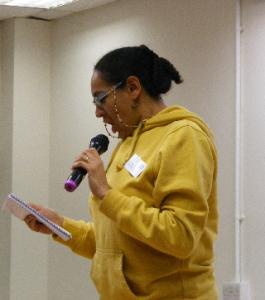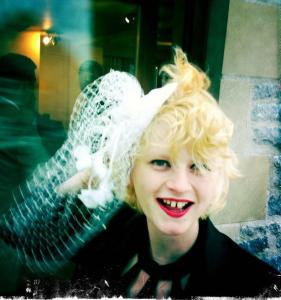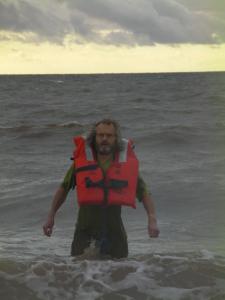Spoken Word Reviews
CELEBRATING COMMUNITY WRITING AND PUBLISHING - TheFED

Set in the informal setting of the Buxton Tap House, the poetry events provide a drop-in/drop-out opportunity to perform or hear poetry. Anything goes, and there were poems on a wide range of subjects, from pet dogs to regional accents to jogging to dementia. There were witty and funny poems, and more brooding, poignant poems. There were such different voices on display, drawing on a variety of experiences, and it created a strong community feel.
You are not expected to perform, and it is nice to draw up a chair and have a drink whilst listening to others’ words. If you do have work that you would like to perform, however, you are encouraged to take the microphone before the least daunting audience imaginable. It is a very pleasant occasion, and everyone is very supportive and enthusiastic.
Even if you only drop in for five minutes, you might well hear something that you really enjoy.
Rufus McAlister
DOVETALES ON THE BORDERLINE: SPANNING THE DOVE - The Packhorse Poets
In the comfortable and friendly atmosphere of The Packhorse Inn in Crowdecote I was invited to listen to poetical musings of the widest range of topics from Fell Walking to Broken Hearts to the everchanging landscape of the Derbyshire Moors. The evening consisted of being introduced to the work of the current Derbyshire Poet Laureate Helen Mort and the Staffordshire Poet Laureate Garry Longdon and the impressive young poet Laureate of Staffordshire Harry Shenton.
The evening opened confidently with the young poet Laureate Harry Shenton his poem entitled ‘Remember’ and ‘Hearts’ were a strong highlight of the night. This was due to the fast intoxicating beat that Shenton creates drawing his audience into his rapid emotions from torment to loss in a matter of seconds. Garry Longdon the Staffordshire Poet Laureate provided the evening with a jovial light hearted tone especially with his poem that stated it was easier to have an affair than attend poetry readings.. The poet Laureate of Sheffield Helen Mort successfully drew the audience back to the core theme of the evening the Derbyshire Landscape and its people. Mort’s poem about Chesterfield was a highlight for me because it initiated a dialogue with the audience about their own connection, memories to this town in the peaks.
The introduction of the Packhorse Poets came swiftly and I truly felt that as soon as this collective of poets began to read the theme of the evening exploded the experience to live, breathe and grow up in Derbyshire’s wild landscape. A member of the poets Bert recounted a poem that he had written about walking past the old mills around the local area. His writing was a tremendous mixture of strong defined character, counterbalanced by a romantic subtlety about the evocative hold of Derbyshire’s past and our own past. This really touched me; it made me consider my own connection that I have to these valleys. There was humorous musings from Paul about the historical attempts to make Sheene into the Athens of the North alongside Margaret’s poetry examining nature and births fragile relationship. The Packhorse Poets are a wonderful collective of poets who provided an evening full of diverse musings on the past, history, love sport and the surrounding landscape area, they belong to.
The arrangement of the evening with the Packhorse Poets and the Poets laureates created a wonderful array of musings of simply what it is to be alive but also a vivid mix of styles from Packhorse Poets Bert’s pastoral description of nature around him to Harry Shenton’s fast and rapid rhymes.
The wonderful array of subjects and styles of the poets within this one evening makes me treasure the power and beauty of spoken word that we can release from the very tip of our tongues. This evening was a celebration of languages power to play, control, amuse, move you as an audience member and more nights celebrating Spoken Word need to appear at Buxton Fringe like this. �
Emmie Alderson
GRINLOW POETRY TRAIL - Stone and Water

The poetry trail was an enormous success. It was well attended with people taking a great interest in the poems as well as the art and the storytelling. It was enhanced greatly by the piano accordion player walking around and other musicians playing in the woods, which at first I heard from a distance. There was also a surprise performance of a choir at 1.30 pm singing four well known songs.
The art and poetry lived happily side by side. In one area there was a row of paintings showing mainly urban scenes each with a corresponding poem on the same subject. There was also a mushroom area with many poems about fairies not far away.
There was a great range of contributors, from people who wrote the occasional poem, to poets with more than a local reputation, through to the immortals like Shakespeare and Virgil.
The subjects included descriptions and feelings provoked by Grinlow Woods, works about the beauty and magic of woodlands, invitations to visit places nearby and poems about tragedies caused by drug-taking. Not all viewed nature as a source of joy. Some dwelt on less pleasant elements related to woodlands and nature such as trees fighting against the elements for survival.
One of my favourite sets of poems was written on large banners which were very eye-catching. The poems are about nature being in a constant state of flux and the poet’s thoughts became absorbed with the process. The poet tries to guess where the raindrops will fly and where they will rebound.
Another of my favourite poems dealt with a human relationship, making analogies with the progression of the seasons.
It all took place in a very beautiful environment with good weather which brought about much social interaction between the viewers.
Roger Horvath
MELODY - Unholy Mess

Melody is an enchanting look at how song appears in and influences our lives. It inspires us to have grand dreams, reminds us of our past and possibly even gives advice that we will always remember. That, anyway, seems to be the power of music for Jemima Foxtrot as she takes the audience on an immersive journey from home to work to home again.
The scene jumps around from a walk home to childhood memories to passages of song, and when she isn’t singing, Foxtrot performs in spoken word poetry. Her poetry is vibrant and imaginative, and conjures up incredible mental images in the unusual connections she makes. The most persistent theme in this work seems to be growing up, whether when she decides she is now a grown-up, or her description of teenage girls at the beach who have the self-awareness and belief that they are not children anymore. Indeed, as a performer Foxtrot seems to encapsulate both an adult maturity and wisdom with the excited exuberance of a child. She bounds around the space with incredible energy, giving a performance for the eyes as well as the ears. The fluidity of such a relentless show is remarkable, and it is clear that she loves her work and performing it. This is excellent and well-structured performance art; engaging and enjoyable with marvellous poetry. It is thoughtful and stimulating, examining the importance of song with intelligence and vigour.�
Rufus McAlister
NEW THOUGHTS - OLD WAR - Buxton Parish Churches

St John's Church, 18 July
This event was described as "an evening of creative writing about World War One by young people in Buxton with musical interludes by local musicians." This rather bald statement hardly tells the whole story.
Over the last month or so around 20 students in years 7-9 (aged 12-14) from Buxton Community School and St Thomas Moore School have volunteered to be part of a creative writing project. Three workshops - led by experienced writers Rob Stevens, F Philip Holland and Helen Stewart - supported the young authors in their work.
So in a very short period of time they have put together their thoughts and responses to what they know and understand about the events of the First World War. Given the fact that many voices are heard - and different groups of writers did not collaborate on the project - it was right and proper that what we heard reflected the range of experiences of those involved directly or otherwise in the War. This was not meant to be a tidy history.
St John's Church had been decorated with a hedgerow bearing red poppies. The groups of writers and readers stood in a line in front of it. They used microphones and read simply and directly to us. There had been minimal rehearsal time but the performance flowed well, the voices were clear and the fact that they were reading their own words meant, perhaps, that they read with more certainty and conviction.
For the most part, of course, they were representing the experiences of people older than themselves - soldiers, widows, factory workers - but the language rang true. Trying to pick out particular parts of such a big event on the basis of a single hearing is possibly unwise and it may be better to wait and examine the text more closely when it is published. Certainly there were some very measured and poignant poems read - reflecting simply but passionately on the loss of close family and comrades.
The young writers had the practical and moral support of the adult choir from St Mary's Church which led the performers in. The choir - and three local musicians - provided interludes with some familiar songs and hymns associated with the War.
This was an important event for many reasons. It was supported by High Peak Borough Council - both financially and through the attendance of the Mayor - and it introduced us to a new generation of performers who we look forward to seeing more of in the years to come.
Keith Savage
OCEAN GOING IDIOT - Rob Coleman

Stand-up comedy is the art of performing material on stage to elicit laughs from the audience. Someone who does not necessarily aim to elicit laughs is called a spoken word artist. Their intention is not to get laughs, it is more like a speech or lecture. This performance is correctly listed in the Spoken Word category. Rob tells his tale with gentle humour to make you smile, engages with his audience and recommends oil for constipation.
Believe it or not this is fringe on the edge. What would induce a fair-skinned five foot something eleven stone stripling to attempt to cross the Atlantic with an incompatible companion and three buckets? Only a naive impulsive idiot thinking he'd make a name for himself. Enter his world of fantasy, hallucinations and humiliation and follow his tale of adventure. So if you want a break from the fast and furious pace of the comedians or are just curious and fancy some quiet British humour, this is for you.
Carolyn Page